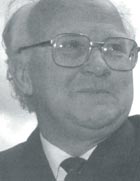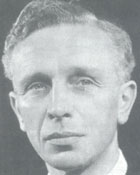2004 Spring Festival - The test pieces
6-May-20044BR take a closer look at this year's test pieces. They are Les Préludes, Liszt, arranged Bram Gay (second edition); Journey into Freedom - Eric Ball and Concerto for Band - John Golland.
 Les Préludes, Liszt, arranged Bram Gay (second edition).
Les Préludes, Liszt, arranged Bram Gay (second edition).
Bram Gay writes:
LISZT provided a synopsis for Les Préludes inspired by a poem of Lamartine. Freely translated the synopsis goes like this:
Life is a series of preludes to that mysterious song of which death sounds the first solemn note. Love forms the dawn of every life, but where is the life in which the dream of bliss is not interrupted by storms which spoil the lovely illusion?
Where is the wounded soul who would not seek forgetfulness in the contemplation of nature? But when the trumpet sounds the alarm he rushes to the place of danger, whatever the cause of conflict, endeavouring to recover his full self-consciousness and possession of his powers.
Listening to the work as pure music, which is how I hear it, it tells us that this is an extemporisation from the pen of one of the greatest virtuosi of all time, based for the most part on three notes heard at the outset.
In 1999 when Elgar Howarth asked me for advice about repertoire for a Rimmer- CD, my view was that the Master's famous -Les Préludes could not be left out. Having looked at the score my friend expressed his equal admiration for it; but as a composer himself he felt unable to record an arrangement where so many liberties had been taken with the original.
The idea of a brass band Preludes having taken root, however, he asked for a new score, one with no cuts, no convenient key-switches and including as much orchestral detail as was feasible. The result, a score of extreme difficulty, is set as a gesture of confidence in those very good bands that aspire to the September Championship.
Liszt's programme is familiar. Life, he suggested, is but a series of preludes to the after-life. In Les Préludes all the experiences of earthly existence are demonstrated; everything from love to war. He did not detail them with reference to the music since they are obvious.
The piece was used as the set work for the 2001 British Open Brass Band Championships held Symphony Hall, Birmingham and which was won by the Yorkshire Building Society Band conducted by Dr. David King.
 Journey into Freedom - Eric Ball.
Journey into Freedom - Eric Ball.
Of all the splendid works of Eric Ball this is surely the one, after Resurgam, most admired by bandsmen. The product of a composer at the height of his powers, with a complete understanding of the medium for which he wrote, it explores and exploits every corner of the band.
As always with E.B. there is a programme, one which reflects his personal philosophy. Journey is a picture of the struggle we all face in coming to terms with life, its problems, its difficulties and its temptations; a struggle which must be won if we are to attain the perfect peace for which we hope.
The composer saw peace not as something passive but as a triumph. Ferociously, then his scored instruction – we must battle with the distractions around us if we are to win through. Here, in perhaps Ball's most heart-warming score, is the struggle and the attainment. In that its programme is not dissimilar to that of Les Préludes it makes an interesting contrast.
The piece itself was first used as the set work at the 1967 National Finals at the Royal Albert Hall, which was won by the Black Dyke Mills Band, conducted by Geoffrey Brand. It has subsequently been used as a test piece at contests throughout the world, including it being the 1982 European Championships, the 1993 First Section National Finals, the 1985 Second Section of the Pontins National Championships, the 1997 First Division Norwegian Championships, as well as the 1975 and 1991 Championship Section Regional Championships. In 1985 it was used as the test piece for the Grand Shield Contest.
Concerto for Band - John Golland.
The music is typical of the style of John Golland's original works for Brass Band. His most famous composition Sounds was used for the European Championships ,shortly after his untimely death in 1993.
Concerto opens in a distinctive and mysterious style which sets the scene for the exciting ‘allegro' movement which gives so much scope for dynamic and musical contrasts. The ‘adagio contabile'has solos for cornet and euphonium, this leading into the avant garde cadenza section with euphonium, cornet, horn, flugel horn and trombone all featured; a great chance to impress. The final ‘lento' bridge leads into the ‘allegro molto' which after a pianissimo passage builds to the ‘maestoso' section concluding the concerto in a rousing style.
If the fact of this work having been written for the National Youth Brass Band of Switzerland leads the unwary to expect less-than-difficult writing the reader of the score is soon disillusioned. The composer here puts the band thoroughly through its paces, each solo instrument being given its solo occasion and full band being made to work very seriously indeed. Hence the title Concerto without naming a solo instrument. This is a showpiece for the entire band.
Golland's style, as individual in its way as that of any composer for the band, wisely stays within the limits bandsmen and their audiences will accept. He writes tonally, looking to rhythm and technical events to produce what most of us regard as modern music. He writes for easy listening, for interesting rehearsals for players, a great deal of head–scratching for conductors and a good day for adjudicators. An ideal test, then?















